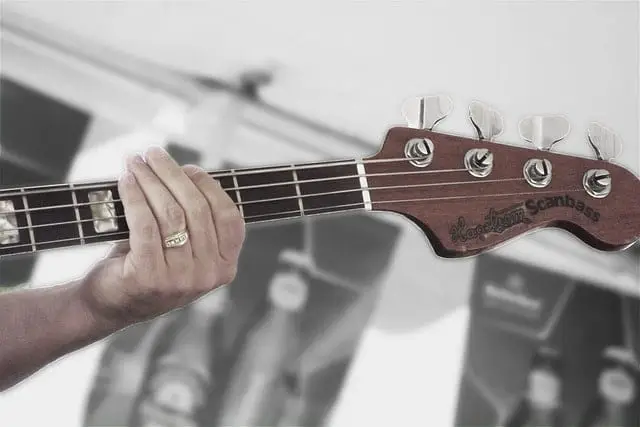Root – Five – Root – Five…
it is a kind of signature bass line – and it works! In country, bluegrass, folk music, as well as in bossa (where it’s root – five – five – root root – five – five); also, a great way to start playing walking bass, for example, is to play root – root – five – five – it gives you four beats per bar and outlines the chord change. For many styles the bass alternating characteristic rhythmic pattern and with a style-intrinsic feel plays a key role. There are many subtleties to root-five and there is lots to say on that, but in this post I want to talk about why the fifth is a bassist’s best friend in so many styles…
A Bassist’s Best Friend?
The 5th shows up early in the overtone series – you can verify that by playing a harmonic on the seventh fret. So you have a harmonic on the 12th (first overtone, the octave) and the next one at the seventh fret – which produces the 5th up. Of course tuning wise that 5th is a tad higher than the fretted D would be, which has to do with our tuning system being well-tempered or equal tempered.
Why is this relevant? Early overtones are contained in the note. So if I hit the open G, the overtones of octaves and fifths are also heard. So the fifth is a very related note, it sounds not too foreign to the root. Hence, when playing the fifth in a groove you add information, but one that is very close to the root. You can easily verify this on your bass. Play a high G (I recommend the 10th fret on the A string) and listen to the sound. Then add a fifth above (D on the 12th fret of D). Play both notes at the same time. it sounds fuller, richer, but still pretty G-ish. On the other hand, if you would make that D an Eb for example, it definitely sounds like a new sound.
So, the fifth is a bassist’s best friend because:
- it sounds congruent with the root,
- does not introduce an entirely new sound quality, just adds fullness to the root sound,
- is not likely to clash with any extensions or chords the chord players might add,
- adds variety without drawing too much attention.
- The five pulling to the one is a very strong bass movement (more on that later)
So now you know one reason why fifths are a bass player’s best friend! But there is much more to fifths, stay tuned for the next blog post on fifths!



